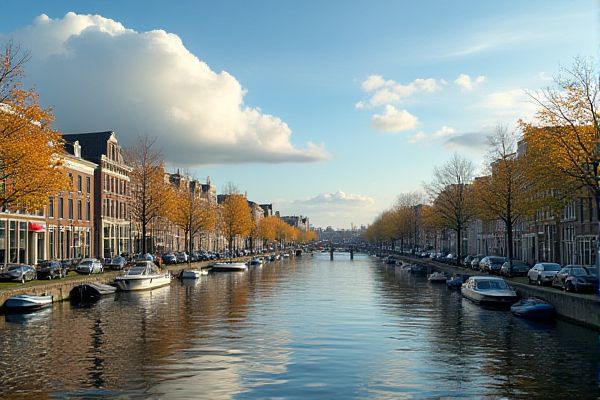
Banking and financial services in Netherlands: Major banks: ING, ABN AMRO, Rabobank. Common account types: Current, savings. Required documents: ID, address proof. Online banking prevalent. iDEAL for online payments. Euro currency used. Direct debit widely used. ATMs accessible. Credit card acceptance varies. Consider international bank accounts.
Major banks: ING, ABN AMRO, Rabobank.
ING, ABN AMRO, and Rabobank are major banks in the Netherlands, each offering a wide range of financial services. ING provides services in retail and business banking, mortgages, and sustainability, while ABN AMRO is a leader in mortgages and savings, and also offers wealth management and corporate banking. Rabobank, with its cooperative structure, focuses on retail and business banking, and has a strong presence in rural areas and among SMEs. For more information about their offerings, you can visit the ING website.
Common account types: Current, savings.
In the Netherlands, common account types include the Current Account (Betaalrekening) for daily transactions like receiving salary, paying bills, and using a debit card, and the Savings Account (Spaarrekening) for saving money separately from the current account, often with low but available interest rates. Additionally, Joint Accounts and Business Accounts are available for shared financial management and business purposes, respectively. For more detailed information about banking as an expat, you can visit the Banking In The Netherlands: A Guide for Expats.
Required documents: ID, address proof.
To operate or interact with financial services in the Netherlands, it is essential to have both a valid proof of identity, such as a passport, identity card, or residence permit, and proof of address, which can be an extract from the foreign population register or a document showing your private address in Latin script. For those intending to open a bank account, additional documents are required, including the Burgerservicenummer (BSN), which is crucial for various formalities in the Netherlands. Proof of address can come in the form of a signed rental contract or utilities bill. For more detailed guidance on these requirements and the necessary documents, visit the Kamer van Koophandel's official page. Having these documents in order ensures you have a smooth experience when dealing with financial services in the country.
Online banking prevalent.
Online banking is highly prevalent in the Netherlands, with over 95% of individuals using online banking in 2023. The most active age group is 45 to 55 years old, with almost 98% utilizing digital banking platforms. This widespread adoption highlights the significant role of technology in modern banking. For more detailed statistics on this topic, visit the comprehensive analysis on Statista.
iDEAL for online payments.
iDEAL is the leading online payment method in the Netherlands, introduced in 2005 by major Dutch banks. It allows consumers to make secure and convenient payments through their mobile banking apps or online bank accounts. With a market share of over 70% and acceptance by over 130,000 e-commerce merchants, iDEAL has firmly established itself as a dominant force in the Dutch e-commerce landscape. To learn more about this innovative payment solution, you can visit the iDEAL Payment Method page on PPRO's website.
Euro currency used.
The Netherlands utilizes the Euro as its currency, aligning with the monetary system of most other European Union countries. This includes a range of notes and coins, from EUR5 to EUR500 notes and 5 cent to EUR2 coins. For more detailed information about the financial landscape in the Netherlands, you can visit Expatica and explore their extensive resources.
Direct debit widely used.
Direct debits are widely used in the Netherlands, facilitated by the SEPA Direct Debit scheme, which allows for regular payments such as phone bills or health insurance, and requires an IBAN and BIC for setup. For more in-depth information on banking options and financial guidance in the Netherlands, you can visit the comprehensive resource on Banks in the Netherlands available on the Expatica website.
ATMs accessible.
In the Netherlands, banks such as ING, Rabobank, and ABN AMRO have implemented various accessibility features for ATMs, including voice guidance, braille options, and tactile notches on bank cards. These banks also offer assistance at ATMs and provide services like in-person help at home for customers with mobility or other disabilities.
Credit card acceptance varies.
In the Netherlands, credit card acceptance has improved, particularly with the completion of the Debit Card Acceptance project, which has enabled most shops to accept Visa Debit and Debit Mastercard cards, although credit cards like Visa Credit Cards are still widely accepted in most shops, restaurants, and hotels.
Consider international bank accounts.
For international bank accounts in the Netherlands, foreigners can consider banks like ABN AMRO, ING, and Rabobank, which offer extensive services, English-speaking customer support, and a wide network of branches. Non-residents can also open accounts, but may need additional documents such as a Tax Identification Number (TIN) and proof of a connection to the Netherlands. For more detailed information, you can visit the guide on Housing Anywhere.
